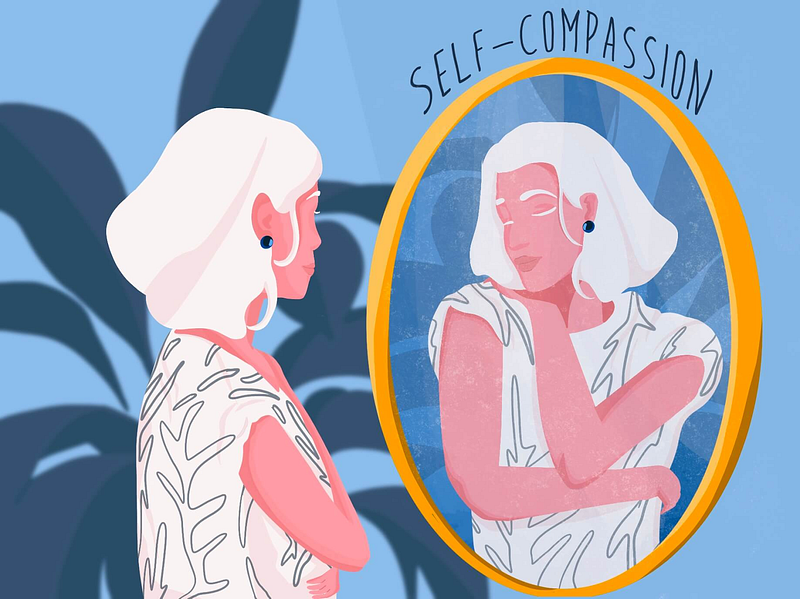How to be More Self-Compassionate
“To love oneself is the beginning of a lifelong romance.”

“To love oneself is the beginning of a lifelong romance.”
- Oscar Wilde
People are flawed and not all-knowing. No matter how hard we try not to, sometimes, we make mistakes.
There are two ways we can respond to a mistake we’ve made. Firstly, we could choose to treat ourselves with compassion and kindness. We could acknowledge the mistake and accept that it happened, and not identify with the mistake as a part of our character. We could see it as a learning lesson, learn from it, forgive ourselves and not repeat the same mistake. Secondly, we could beat ourselves up over it, berate ourselves for not knowing better, dig a hole for us to stick our heads in and wallow in despair, leaving ourselves in a paralyzed state of self-hatred. Laying in bed at midnight, eyes wide awake, overthinking about that one time you did something embarrassing or said the wrong thing.
We all know that mistakes are an inevitable part of life, so which way would you like to respond? If you want to learn how to respond the first way, feel free to continue reading about how to be more self-compassionate.
Defining Self-Compassion

Self-compassion is a positive attitude we can have towards ourselves. It means being gentle and offering non-judgemental understanding to yourself, accepting that you are human, a person, an imperfect being that doesn’t know all the secrets to the universe and is thus capable of making mistakes sometimes. Self-compassion means not dwelling on mistakes or beating yourself up for making them but instead, choosing to be kind to yourself like you would to a best friend, to be mindful of who you really are, to acknowledge and accept yourself with your flaws, and allow yourself the freedom to be imperfect, to be human. It means forgiving, accepting and loving yourself even when you make mistakes, or when things are less than optimal.
Why exactly is self-compassion so important, though? There has been a lot of research into self-compassion over the last decade that has demonstrated its benefits for our wellbeing. Self-compassion has been found to be positively correlated with greater life satisfaction and improved mental health, reducing anxiety, stress and depression. Research shows that people who are more self-compassionate tend to experience greater overall happiness, motivation, better relationships and better physical health. This also increases self-worth and strengthens the resilience needed to cope with stressful life events that many of us are likely to eventually encounter.
Moreover, self-compassion can help us steer clear of anger and self-pity, helping us remain patient and loving towards ourselves and others in our lives even when we face moments of stress, confusion or sadness. Even when we slip up, self-compassion can help us better rebound from our errors, find our way back and refocus on our journey more quickly.
So, all these things sound great but how do we show ourselves self-compassion?
How to be more self-compassionate
1. Practise forgiveness
Stop punishing yourself for your mistakes. The mistake you made was a learning experience and does not define you as a human being. Accept that you are not perfect and be gentle with yourself when you are confronted with your shortcomings. You made one mistake, one error. If you feel guilty, you can repent for your mistake by becoming someone who will not repeat that same mistake ever again. Turn your mistake into a lesson. Stop beating yourself up for events that have already passed because no matter how hard you are on yourself now, you can’t change what has already happened. To quote Melanie Kouloruris, there is no sense in punishing your future for the mistakes of your past. Forgive yourself, grow from it, and then let it go.
“As flawed as you may be, you must accept yourself, flaws and all, if you are to make progress in your life.”
— tiny buddha blog
When you forgive yourself, you are not pretending as though your mistake never happened. You are instead, acknowledging that whilst your actions have consequences, those consequences do not need to include self-inflicted negative feelings and self-sabotage.
To quote the tiny buddha blog, not forgiving yourself is like picking at an open wound, you are only making a bad situation worse. The wound is already there, but you do have control over your reaction to it, and you can stop it from getting worse. If you forgive yourself when you make a mistake, it’s easier to address the consequences of your action in a productive way.
2. Practise unconditional self-love
Forgiving yourself might not be easy, but always remembering that you are worthy of love, no matter what mistakes you make, does help. Be aware of moments when you get a sense of self-worth from performance, perfection or external validation and remind yourself that you do not need to be a certain way to be worthy of love. You were born worthy.
Some ways to remind yourself that you are worthy, even when you don’t feel like it, is to put a kind reminder for you to appreciate and be kind to yourself in the form of a digital wallpaper, a sticky note near your desk, and or listen and affirm positive affirmations in the morning and whenever you need a boost.
3. Employ a growth mindset
There are two types of mindsets, a fixed mindset and a growth mindset. A growth mindset is freeing while a fixed mindset is limiting. According to Stanford psychologist Dr. Carol Dweck, a growth mindset is one that embraces challenges and views failure not as evidence of unintelligence, but as a heartening springboard for growth and for stretching our existing abilities, a lesson rather than a mistake. A fixed mindset involves giving up easily and believing that factors like intelligence, success and talents are static, thus any further effort is fruitless.
One can develop a growth mindset by taking on challenges whilst viewing them as learning experiences, jotting down realistic, clear goals, proactively seeking feedback from your peers, adopting a more positive and optimistic attitude towards life and practicing mindfulness.
4. Express gratitude
Rather than wishing for what we do not have and focusing on what we lack, we can instead shift our focus to appreciating what we do have right now, in the present! By focusing on our blessings, we grow a gentler inner voice, moving the focus away from our shortcomings and towards what is good in our lives instead.
5. Be mindful
Research shows that mindfulness has a positive impact on self-compassion as it tends to lessen self-judgment. To practice being mindful is for one to do their best to always live in the moment and to be aware of what is happening right now, without judgment or labeling it. Allow what you think or feel to have its moment, don’t exaggerate or suppress it. Allow yourself to feel your emotions for what it is, processing your emotions without judging them or yourself, and then letting them go without attachment.
6. Talk to your internal voice
Personalize your internal voice, your internal critic. Imagine that there is another entity that is thinking your self-critical thoughts and have a chat with them. You can even give this entity a name to reinforce the idea that this voice is separate from you.
During your conversation, ask your internal critic what is its positive intention, what good purpose does it serve. This voice is saying what it’s saying for a reason. It might be to protect you, prevent you from making the same mistakes again or to help you improve in some way. When you realize that your thoughts of shame or guilt are intended for your benefit, it becomes easier to forgive yourself. You can find another way to satisfy that positive intent, which can help reduce your feelings of guilt. Doing this can also help you identify unhealthy thought patterns that might be adversely affecting your ability to forgive yourself.
7. Remember that you’re not a bad person
When you mess up, or hurt someone else, you may experience a lot of guilt and shame that makes you question whether there’s something wrong with you, but in reality, good people make mistakes too. Even the kindest, most loving, happy and successful people have made mistakes.
There is a big difference between doing a bad thing and being a bad person. Even when you did the thing that you regret, you most likely had a valid reason for doing so at the time, even if the reason doesn’t make much rational sense. It is very unlikely you did something bad because you are a fundamentally bad person, and more likely that there was a reason behind your actions.

Forgiving yourself for a mistake is more challenging than forgiving someone else, sometimes because we set higher standards for ourselves than for others. Despite the challenge, we must have the capacity to forgive ourselves in order to foster good emotional health. We are our own lifelong companions on our journey of life, from the beginning all the way to the end. The voice we hear in our heads is the voice we will live with forever so it is important that we speak to ourselves in a way that is filled with compassion and kindness in order to live a more loving, fulfilled life.
“You can search throughout the entire universe for someone who is more deserving of your love and affection than you are yourself, and that person is not to be found anywhere. You yourself, as much as anybody in the entire universe deserve your love and affection.”
— Buddha
Written by: Ruby Seet. Edited by: Chien Wen.



